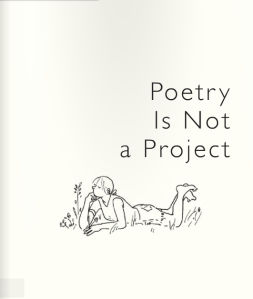Poetry Is Not a Project by Dorthea Lasky
 In her chapbook, Poetry Is Not a Project, Dorothea Lasky offers us insight to how poets may be going about discussing their work, or their “projects.” However, Lasky penetrates this notion by saying outright that poetry is not a project, as the title of the short electronic text clearly articulates across its cover page. And during my first read through, I ate up the pages. It is a short piece but incredibly noteworthy. Lasky covers major, theoretical, and argumentative ground in the almost 20 pages of content Poetry Is Not a Project is.
In her chapbook, Poetry Is Not a Project, Dorothea Lasky offers us insight to how poets may be going about discussing their work, or their “projects.” However, Lasky penetrates this notion by saying outright that poetry is not a project, as the title of the short electronic text clearly articulates across its cover page. And during my first read through, I ate up the pages. It is a short piece but incredibly noteworthy. Lasky covers major, theoretical, and argumentative ground in the almost 20 pages of content Poetry Is Not a Project is.
Lasky, both effectively luminous in her polemic, essayistic prose and ambitious in her art-should-be-art idea, organizes her argument into four sections: Habitus, An Example, What is Really Not Intention, & What We Write And What We Write for.
Each micro-chapter tightens what Lasky contends as a failure to understand what poems and projects imply. Art making is the blood and muck of single utterances that investigate the human drama of our universal consciousness. That poems dig into this drama and make their hard-earned message available to our humanity is a dark path. A project then, according to Lasky, illuminates that darkness. It holds too much certainty. It fashions an overwrought, future-oriented destination of art. She proclaims, “I want this century to be full of poets who write poems, not full of poets who conduct projects and nothing more.” And Lasky handholds us. Gives us reason to ruminate. Why settle for mediocrity of poem-making for hip ideas meant for a portfolio?
Each poem should be its own endeavor in the mysteries of itself. Lasky urges poets to discover the nonlinearity of their journeys. The twists and turns. The moonless nights. The sudden joys and sufferings and rich human stories embedded beneath the meanings that poems birth. Don’t name your destination. Don’t settle.
Naming your intentions is great for some things, but not for poetry.
Along the same lines, Lasky illustrates that understanding all the meanings and goals of a poem you plan to write is folly. It suffocates any possible discovery. It suppresses what you might find deeper in the poem’s world. You have only a concept. An idea. An empty space with clean corners—lacking the extravagance and boldness in risking yourself for the poem.
Any other way, all you have created is just a decorated empty room.
Though poets like their whitespace, Lasky advocates for a dark space, an uncertainty to the poet’s line of vision. As poets shift to think more kaleidoscopically, they face the blood and organs of experience—the breath and warmth—of adding air and energy to the empty room. She fills it with content. Not just the skin and bones. Not just the single musical note but a bended note that tells a story, colors with sustain, and curves with gut-wrenching intensity. No illuminated maps to see our way through the poem. No last lines that show us where to go.
The terrain of a poem is unmapped.
Lasky divulges a truth we need to consider. She tells poets to start “valuing poems over projects” because a project tries too hard to name or taxonomize where its destination is. It projects light in a single straight line, when what poets should really be doing is scattering the light, mixing it up with the dark heft of their struggle to shovel deep into the earth. Poets should scrape at uncertainty and should celebrate their discovery of poems, of art-making—rather than glaze it over with intention.
Ultimately, in her brilliant, oh-so-Lasky-way, she calls on, “let’s make a party, poets. And let’s have everyone join us there.”
Yes, a party for the ages where Lasky’s encouragement may as well be the savior from our rhetorical mediocrity. In all seriousness.
Her chapbook is powerful. It reminds us that poetry isn’t a project. That poetry is the disordered havoc from which we gain clarity and insight. That poetry is hungry. It is survival in the dimmest of places.
Lasky lays her earned claim, her graceful yawp over not just the great American poem and its poets but over poetry that stretches across the rooftops of the world, “I don’t think Emily Dickinson gave a damn about a project.”
We would agree. I mean, what is a life without surprises deep in such promising mystery?
Poetry Is Not a Project is available for free from Ugly Duckling Presse
Michael Wasson, nimíipuu from the Nez Perce Reservation in Idaho, earned his MFA from Oregon State University and his BA from Lewis-Clark State College. He received a Joyce Carol Oates Award in Poetry, and his work is included or forthcoming in Poetry Kanto, As/Us, Hayden’s Ferry Review, American Indian Culture and Research Journal, Cutthroat, and elsewhere.
YES.